Want to know more about the Best Veterinary Schools In the US and make an informed decision? Here is a good place to start.
Are you tired of feeling like you’re barking up the wrong tree when it comes to finding the best veterinary schools in the US? Look no further!
As a paw-some solution, we’ve compiled a list of the top schools for aspiring vets, so you can finally fetch that dream career without feeling like a lost puppy.
Get ready to unleash your potential and sink your teeth into some serious knowledge. Let’s dive in!
Please note that schools are selected based on our criteria (at the end of the article), ranked by the latest acceptance rate.
Table of Contents
#25. Kansas State University


- Acceptance rate: 95%
- Average entry score: 1165 SAT or 24-28 ACT
- Student-to-faculty ratio: 18 to 1
- Estimated cost of attendance (tuition and fees): $42,057
- Average earning potential for graduates: $70,600 (College Simply)
Kansas State University’s College of Veterinary Medicine has several programs for students interested in veterinary practice.
The Doctor of Veterinary Medicine program emphasizes hands-on learning through clinical rotations and offers specialized tracks in food animal medicine, small animal medicine, and more.
Key characteristics of these programs include a strong emphasis on animal welfare, a commitment to research and innovation, and a focus on preparing students for successful careers in a variety of veterinary fields.
Source: K-State College of Veterinary Medicine
#24. University of Kentucky


- Acceptance rate: 94%
- Average entry score: 1070-1320 SAT or 21-28 ACT
- Student-to-faculty ratio: 16 to 1
- Estimated cost of attendance (tuition and fees): $54,688
- Average earning potential for graduates: $54,000 (College Simply)
The University of Kentucky College of Veterinary Medicine is widely recognized for its excellence in animal health care, research, and education.
With state-of-the-art facilities, cutting-edge technology, and a team of world-class faculty and staff, the college provides students with hands-on experience in clinical settings and research laboratories.
The emphasis on interdisciplinary collaboration and community engagement prepares graduates to make a positive impact on the lives of animals and their owners.
Source: University of Kentucky
#23. Iowa State University

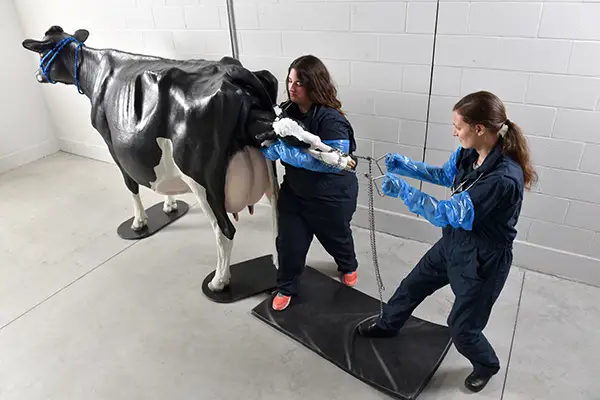
- Acceptance rate: 91%
- Average entry score: 1100-1340 SAT or 21-28 ACT
- Student-to-faculty ratio: 19 to 1
- Estimated cost of attendance (tuition and fees): $21,940-$37,128
- Average earning potential for graduates: $72,100 (College Simply)
Iowa State University offers world-class veterinary medicine programs that prepare students to become leaders in animal health and welfare.
The programs cover a wide range of topics including clinical practice, research, and public health. Students have access to state-of-the-art facilities and resources, as well as internationally recognized faculty who are leaders in their fields.
Graduates of the programs are highly sought after and go on to successful careers in veterinary medicine and related fields.
Source: College of Veterinary Medicine, Iowa State University
#22. Colorado State University
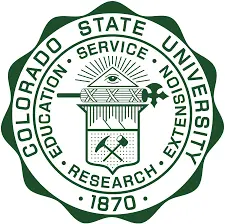
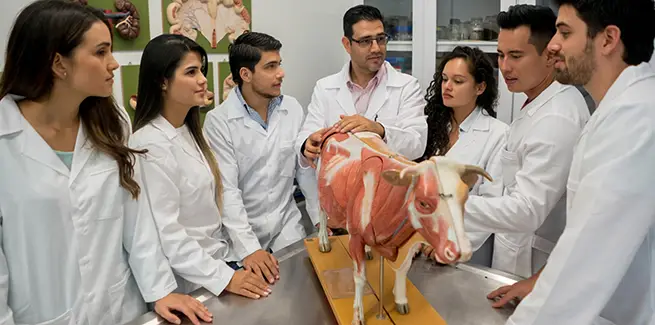
- Acceptance rate: 89%
- Average entry score: 1080-1290 SAT or 23-29 ACT
- Student-to-faculty ratio: 17 to 1
- Estimated cost of attendance (tuition and fees): $29,109-$48,389
- Average earning potential for graduates: $68,600 (College Simply)
Graduates of Colorado State University’s vet medicine program go on to have successful careers due to the comprehensive and rigorous curriculum they undergo during their studies.
The program provides students with hands-on experiences in clinical settings and research opportunities, preparing them for real-world scenarios.
This school’s faculty is made up of experienced professionals who offer personalized attention to each student.
Additionally, the university’s strong reputation and network of alumni provide graduates with ample career opportunities and connections in the industry.
Source: Colorado State University
Similar articles like this:
- 15 Must-Read Veterinary Science Books For Lifetime Learners
- 10 Highest Paying Zoology Jobs to Consider 2024
- 10 Highest Paying Veterinary Jobs to Consider 2024
- 10 Highest Paying Marine Biology Jobs 2024
#21. Oregon State University


- Acceptance rate: 89%
- Average entry score: 1120-1360 SAT or 21-28 ACT
- Student-to-faculty ratio: 18 to 1
- Estimated cost of attendance (tuition and fees): $30,302-$50,402
- Average earning potential for graduates: $70,400 (College Simply)
Oregon State University’s Doctor of Veterinary Medicine (DVM) program prepares students to become competent and compassionate veterinarians.
The program provides a comprehensive education in veterinary medicine. Graduates of the program are equipped with the skills and knowledge to diagnose and treat animals of all sizes and species.
The end product is a highly skilled and proficient veterinarian ready to make a positive impact in the field of animal health.
Source: Carlos College of Veterinary Medicine
#20. Michigan State University


- Acceptance rate: 83%
- Average entry score: 1100-1320 SAT or 23-29 ACT
- Student-to-faculty ratio: 16 to 1
- Estimated cost of attendance (tuition and fees): $29,184-$54,490
- Average earning potential for graduates: $73,800 (College Simply)
Michigan State University offers a comprehensive vet medicine program that includes both vet nursing and pre-veterinary medicine courses.
Vet nursing students gain hands-on experience in animal care, while pre-veterinary medicine students learn the fundamentals of animal health and biology.
These courses provide students with the knowledge and skills to pursue careers in veterinary medicine or related fields, such as animal research or public health.
Source: MSU College of Veterinary Medicine
#19. Washington State University


- Acceptance rate: 80%
- Average entry score: 1020-1240 SAT or 18-25 ACT
- Student-to-faculty ratio: 15 to 1
- Estimated cost of attendance (tuition and fees): $28,669-$43,985
- Average earning potential for graduates: $77,800 (College Simply)
Washington State University offers a broad-based veterinary medicine program that is among the best in the nation.
The program includes a four-year Doctor of Veterinary Medicine (DVM) degree, as well as several graduate programs and residencies.
Students have access to state-of-the-art facilities, including a veterinary teaching hospital and research labs. The program also emphasizes hands-on experience through clinical rotations and externships.
Source: Washington State University
#18. University of Tennessee Knoxville


- Acceptance rate: 78%
- Average entry score: 1240 SAT or 27 ACT
- Student-to-faculty ratio: 17 to 1
- Estimated cost of attendance (tuition and fees): $32,658-$50,848
- Average earning potential for graduates: $69,200 (College Simply)
Students prefer veterinary medicine programs at the University of Tennessee, Knoxville because they offer a wide range of hands-on clinical experiences, state-of-the-art facilities, and a comprehensive curriculum that covers all aspects of animal healthcare.
The faculty is composed of world-renowned researchers and experienced clinicians who provide mentorship and guidance to students throughout their academic journey.
Additionally, the university’s location in a thriving city provides ample opportunities for students to gain practical experience working with animals in diverse settings.
Source: University of Tennessee Knoxville
Similar articles like this:
- 25 Best Schools For Soil Sciences In The US
- 25 Best Art History Schools In The US
- 25 Best Schools For Aerospace Engineering In The US
#17. Auburn University


- Acceptance rate: 71%
- Average entry score: 1170-1350 SAT or 24-30 ACT
- Student-to-faculty ratio: 20 to 1
- Estimated cost of attendance (tuition and fees): $32,678-$52,838
- Average earning potential for graduates: $73,800 (College Simply)
The College of Veterinary Medicine at Auburn University offers programs for students who wish to enter various careers in veterinary medicine.
With a strong emphasis on hands-on learning and state-of-the-art facilities, students graduate with the skills and knowledge necessary to provide exceptional care to animals of all kinds.
Through the program, trainees acquire knowledge and skills that make them well-suited to a career as a veterinarian.
Source: Auburn University College of Veterinary Medicine
#16. University of Minnesota Twin Cities

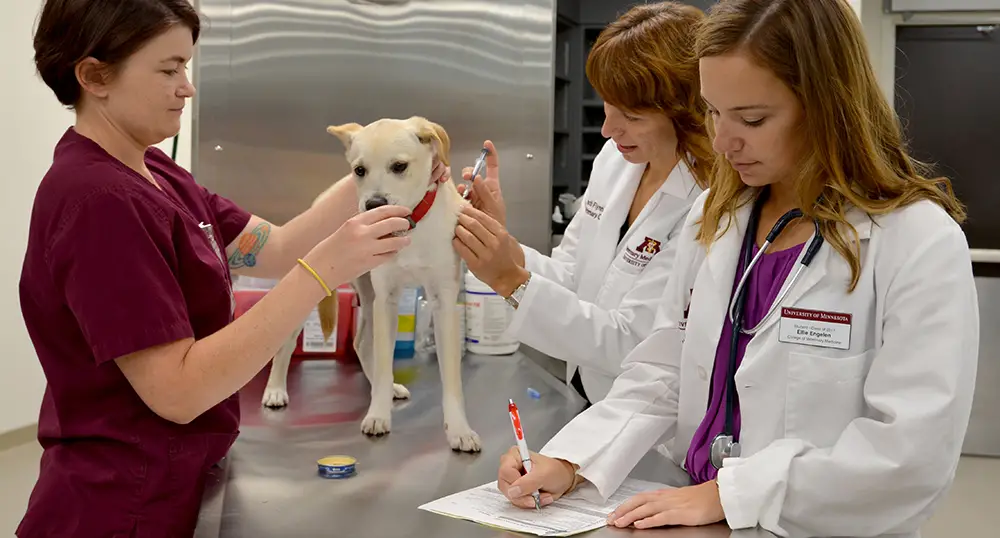
- Acceptance rate: 70%
- Average entry score: 1330-1500 SAT or 27-32 ACT
- Student-to-faculty ratio: 17 to 1
- Estimated cost of attendance (tuition and fees): $23,110-$52,088
- Average earning potential for graduates: $69,700 (College Simply)
The University of Minnesota Twin Cities offers a comprehensive veterinary medicine program, with a focus on producing skilled and compassionate veterinary professionals.
This program produces veterinarians who can provide exceptional care for animals, engage in cutting-edge research to advance veterinary medicine, and effectively communicate with clients.
With state-of-the-art facilities and a diverse range of clinical experiences, students in the program receive a well-rounded education that prepares them for success in the field of veterinary medicine.
Source: University of Minnesota
#15. Ohio State University


- Acceptance rate: 65%
- Average entry score: 1250-1440 SAT or 26-32 ACT
- Student-to-faculty ratio: 19 to 1
- Estimated cost of attendance (tuition and fees): $39,811-$40,811
- Average earning potential for graduates: $74,100 (College Simply)
The Ohio State University’s College of Veterinary Medicine offers various programs ranging from pre-vet to graduate-level studies.
This college provides academic and career support services to ensure student success.
Additionally, their alumni network spans across the country and offers mentorship opportunities, job connections, and continuing education resources.
The college has a strong reputation for producing high-quality veterinarians, with many of their graduates going on to become leaders in the field.
Source: Ohio State University
#14. Texas A&M University College Station


- Acceptance rate: 64%
- Average entry score: 1160-1380 SAT or 25-31 ACT
- Student-to-faculty ratio: 21 to 1
- Estimated cost of attendance (tuition and fees): $26,268-$42,675
- Average earning potential for graduates: $79,300 (College Simply)
Texas A&M University College Station offers a Doctor of Veterinary Medicine (DVM) program, a four-year program that provides students with a comprehensive education in veterinary medicine.
The program is accredited by the American Veterinary Medical Association (AVMA), and it prepares students for careers in various veterinary settings.
Students have access to state-of-the-art facilities, including a large animal hospital, a diagnostic laboratory, and a veterinary medical center.
Source: Texas A&M University
Similar articles like this:
- 25 Best Schools For Business Management Studies In The US
- 25 Best Schools For Programming In The US
- 25 Best Commerce Schools In The US
#13. University of Pennsylvania


- Acceptance rate: 64%
- Average entry score: 1460-1570 SAT or 33-35 ACT
- Student-to-faculty ratio: 7 to 1
- Estimated cost of attendance (tuition and fees): $65,790
- Average earning potential for graduates: $63,400 (College Simply)
Students prefer veterinary medicine programs at the University of Pennsylvania due to its world-renowned reputation for veterinary education and research.
The program offers diverse clinical experiences, cutting-edge research opportunities, and a collaborative learning environment fostering innovation and excellence.
Additionally, students benefit from access to state-of-the-art facilities, experienced faculty, and a strong alumni network.
This combination of academic rigor, practical experience, and professional networking makes the University of Pennsylvania an attractive choice for aspiring veterinarians.
Source: University of Pennsylvania
#12. Tuskegee University


- Acceptance rate: 61%
- Average entry score: 940-1180 SAT or 18-25 ACT
- Student-to-faculty ratio: 14 to 1
- Estimated cost of attendance (tuition and fees): $42,108
- Average earning potential for graduates: $69,700 (College Simply)
The Tuskegee University College of Veterinary Medicine is widely recognized as one of the best veterinary programs in the US. This program boasts a diverse student body and faculty, with a strong emphasis on serving underrepresented communities.
Students receive hands-on experience in the university’s teaching hospital and through externship opportunities. The program also has a strong research focus, with opportunities for students to participate in cutting-edge research projects.
Graduates of the program are highly sought after for their clinical skills, research abilities, and commitment to community service.
Source: College of Veterinary Medicine, Tuskegee University
#11. Purdue University West Lafayette


- Acceptance rate: 60%
- Average entry score: 1190-1430 SAT or 26-33 ACT
- Student-to-faculty ratio: 14 to 1
- Estimated cost of attendance (tuition and fees): $23,062-$41,864
- Average earning potential for graduates: $78,300 (College Simply)
Purdue’s veterinary medicine program fosters a community of learning and growth for aspiring veterinarians.
Students benefit from small class sizes, hands-on experience in the Veterinary Teaching Hospital, and opportunities to participate in research and clinical trials.
The program also emphasizes professional development, with resources available for students to network and gain real-world experience through externships and internships.
Source: College of Veterinary Medicine
#10. University of Wisconsin Madison

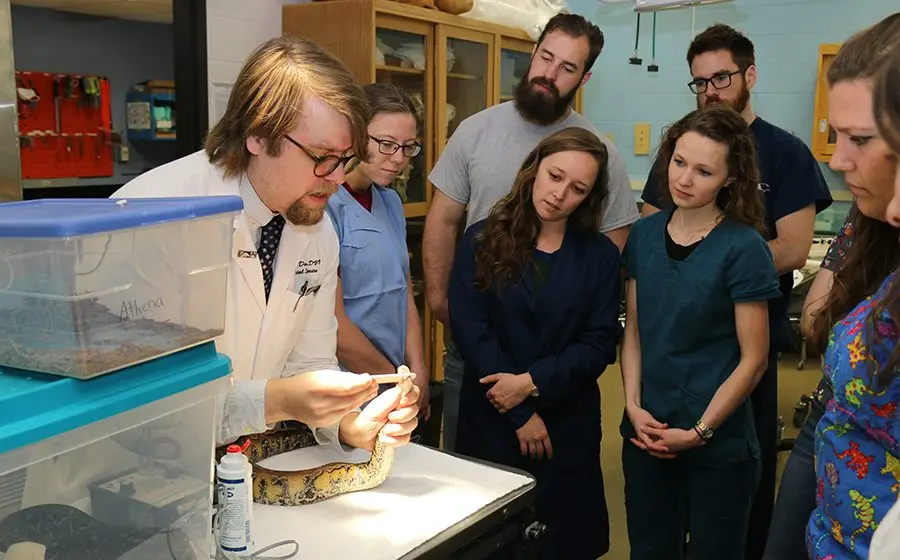
- Acceptance rate: 60%
- Average entry score: 1480 SAT or 32 ACT
- Student-to-faculty ratio: 17 to 1
- Estimated cost of attendance (tuition and fees): $10,796-$39,427
- Average earning potential for graduates: $70,900 (College Simply)
The University of Wisconsin-Madison’s School of Veterinary Medicine is dedicated to producing exceptional veterinary professionals.
With a focus on hands-on, practical learning and cutting-edge research, graduates are equipped with the skills and knowledge necessary to provide high-quality medical care to all types of animals.
From companion pets to farm animals and wildlife, UW-Madison’s veterinary medicine program produces graduates ready to positively impact the world.
Source: UW-Madison
Similar articles like this:
#9. University of Missouri


- Acceptance rate: 56%
- Average entry score: 1140 SAT or 24 ACT
- Student-to-faculty ratio: 19 to 1
- Estimated cost of attendance (tuition and fees): $27,917-$47,097
- Average earning potential for graduates: $75,600 (College Simply)
The University of Missouri’s College of Veterinary Medicine is a renowned institution that offers top-notch education and research opportunities in veterinary medicine.
Their programs are highly competitive and provide students with hands-on training and clinical experience. As a top research institution, the University of Missouri’s efforts are focused on infectious diseases, genomics, and animal welfare.
This institution also collaborates with other institutions and industry partners to advance scientific knowledge and improve animal health.
Source: University of Missouri College of Veterinary Medicine
#8. University of Georgia


- Acceptance rate: 55%
- Average entry score: 1270-1450 SAT or 29-33 ACT
- Student-to-faculty ratio: 17 to 1
- Estimated cost of attendance (tuition and fees): $27,958-$46,998
- Average earning potential for graduates: $70,100 (College Simply)
The University of Georgia’s College of Veterinary Medicine is dedicated to providing students with an exceptional education in veterinary medicine.
This college’s focus on cutting-edge research in animal health allows students to stay up-to-date with the latest advancements in the field.
State-of-the-art facilities, including a Veterinary Teaching Hospital, provide students with hands-on experience treating a wide range of animal species.
Source: UGA
#7. University of California, Davis

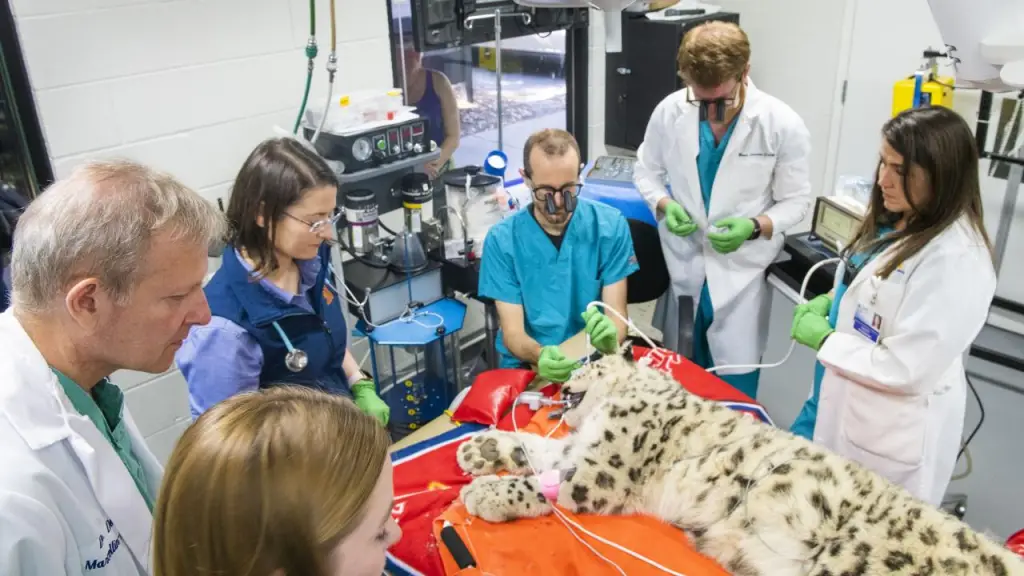
- Acceptance rate: 46%
- Average entry score: 1160-1400 SAT
- Student-to-faculty ratio: 21 to 1
- Estimated cost of attendance (tuition and fees): $37,122-$66,876
- Average earning potential for graduates: $66,300 (College Simply)
The veterinary medicine programs at UC Davis provide students with a comprehensive education in animal health and welfare. This equips them with the knowledge and skills necessary to become successful professionals in the field.
Through hands-on clinical experiences, research opportunities, and exposure to a diverse range of animal species and medical conditions, students are able to develop their clinical reasoning, critical thinking, and problem-solving abilities.
Source: UC Davis Veterinary Medicine
What’s it like to study at UC Davis?
#6. North Carolina State University

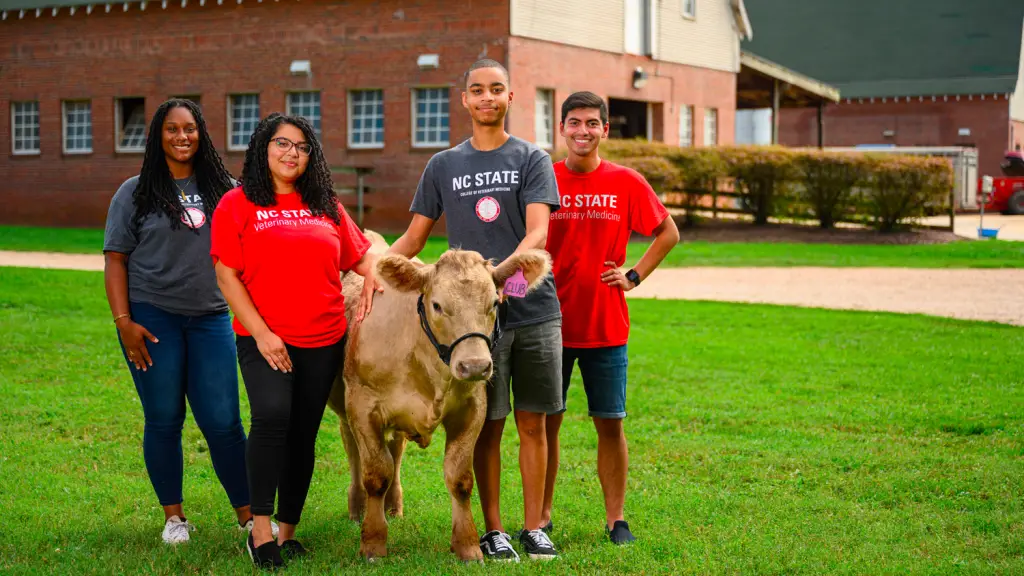
- Acceptance rate: 46%
- Average entry score: 1260-1420 SAT or 24-31 ACT
- Student-to-faculty ratio: 15 to 1
- Estimated cost of attendance (tuition and fees): $24,986-$45,771
- Average earning potential for graduates: $70,000 (College Simply)
North Carolina State University offers a world-class veterinary program that provides students with hands-on experience in clinical rotations, research opportunities, and community outreach.
NC State’s College of Veterinary Medicine is one of the top-ranked veterinary programs in the nation, offering state-of-the-art facilities and a diverse curriculum that prepares students for careers in veterinary medicine.
Students have access to advanced technology, including digital radiology and imaging, while also participating in research projects that aim to improve animal health and welfare.
Source: NC State University
What’s it like to study at North Carolina State University?
Similar articles like this:
- Best Schools For Geography Degrees
- 25 Best Business Administration Schools In The US
- Best Schools For Forensic Science
#5. University of Illinois at Urbana-Champaign


- Acceptance rate: 43%
- Average entry score: 1210-1470 SAT or 27-33 ACT
- Student-to-faculty ratio: 20 to 1
- Estimated cost of attendance (tuition and fees): $35,210-$61,872
- Average earning potential for graduates: $77,300 (College Simply)
Graduates from the University of Illinois at Urbana-Champaign are successful due to the university’s strong academic programs and emphasis on innovation and research.
The university has a reputation for producing graduates who are well-prepared for the workforce and have a strong foundation in their respective fields.
Additionally, the university’s location in the heart of the Midwest provides graduates with access to a large network of industry leaders and job opportunities in a variety of fields.
Source: University of Illinois at Urbana-Champaign
#4. University of Florida

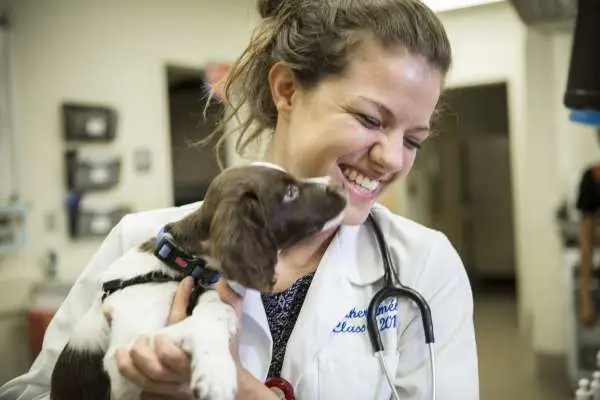
- Acceptance rate: 42%
- Average entry score: 1300-1470 SAT or 29-33 ACT
- Student-to-faculty ratio: 18 to 1
- Estimated cost of attendance (tuition and fees): $21,430-$43,708
- Average earning potential for graduates: $76,200 (College Simply)
The University of Florida’s College of Veterinary Medicine boasts an esteemed faculty of over 30 board-certified specialists, many of whom are leaders in their respective fields.
With a focus on interdisciplinary collaboration and cutting-edge research, the college offers a wide range of programs including DVM, MS, Ph.D., and dual degree options.
Students have the opportunity to learn from and work alongside experienced professionals in state-of-the-art facilities, preparing them for successful careers in veterinary medicine.
Source: UF Health
#3. University of Maryland College Park


- Acceptance rate: 40%
- Average entry score: 1280-1470 SAT or 30-34 ACT
- Student-to-faculty ratio: 18 to 1
- Estimated cost of attendance (tuition and fees): $10,955-$50,000
- Average earning potential for graduates: $62,300 (College Simply)
The University of Maryland College Park offers a Doctor of Veterinary Medicine (DVM) program that prepares students for successful careers in the field of veterinary medicine.
Graduates of the program are equipped with the knowledge and skills necessary to diagnose and treat animal illnesses, perform surgery, and provide preventative care.
The program emphasizes hands-on experience and real-world learning opportunities, ensuring that graduates are ready to positively impact the health and well-being of animals in their communities.
Source: University of Maryland
What’s it like to study at the University of Maryland College Park?
#2. Tufts University

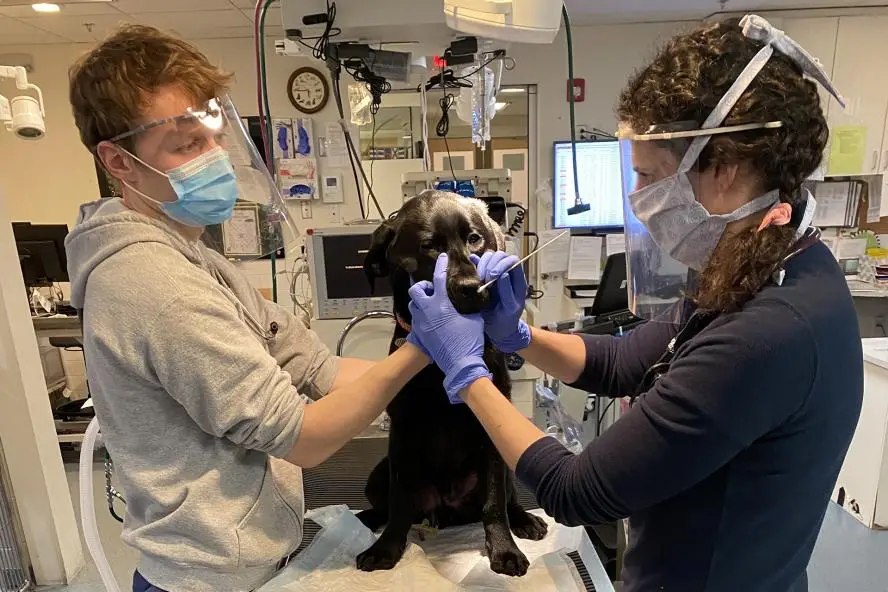
- Acceptance rate: 14%
- Average entry score: 1440-1550 SAT or 33-35 ACT
- Student-to-faculty ratio: 9 to 1
- Estimated cost of attendance (tuition and fees): $81,700
- Average earning potential for graduates: $72,500 (College Simply)
Tufts University’s School of Veterinary Medicine offers a comprehensive curriculum that provides students with the knowledge, skills, and experience necessary to become exemplary veterinarians.
Students gain hands-on experience in state-of-the-art facilities, working with world-class faculty and staff, and learning the latest techniques and technologies in the field.
Graduates of Tufts University’s veterinary medicine programs are well-equipped to excel in their careers and make a positive impact on the world.
Source: Tufts University
What’s it like to study at Tufts University?
#1. Cornell University


- Acceptance rate: 11%
- Average entry score: 1400-1460 SAT or 33-35 ACT
- Student-to-faculty ratio: 9 to 1
- Estimated cost of attendance (tuition and fees): $80,287
- Average earning potential for graduates: $61,300 (College Simply)
Cornell University’s College of Veterinary Medicine provides a rich learning environment for students pursuing veterinary medicine.
The program offers a variety of clinical and research experiences to help students prepare for a career in the field.
Students benefit from a diverse community of faculty and peers, as well as opportunities for professional development and networking.
The program also emphasizes interdisciplinary collaboration and a commitment to advancing the field of veterinary medicine.
Source: Cornell University
What’s it like to study at Cornell University?
Conclusion
Our list highlights some of the best in the United States, offering top-notch education, research opportunities, and hands-on experience.
As you make your decision, consider the factors that matter most to you, such as location, program offerings, and faculty expertise.
With hard work and dedication, you can achieve your dream of becoming a skilled and compassionate veterinarian. Good luck in your journey toward a fulfilling career in veterinary medicine.
Selection Criteria
Here is a list of the factors we considered when selecting the best veterinary medical colleges:
Please note that the order in this list might vary by ranking criteria and sources.
- Reputation and ranking of the school: We looked for schools that have a strong reputation and high ranking in the field of veterinary medicine.
- Faculty expertise, qualifications, and specialization: We researched the faculty members and their areas of expertise and qualifications to ensure that the school has professors with relevant expertise and specialization in the areas of veterinary medicine that are of interest.
- Curriculum and resources: We evaluated the curriculum to ensure it aligns with students’ interests and career goals and considered the quality of the school’s facilities and resources, such as labs, equipment, and libraries.
- Opportunities for hands-on learning and research: We looked for schools that provide opportunities for hands-on experience through internships, co-op programs, or fieldwork.
- Student support services and alumni network: We considered the availability of support services and the strength of the alumni network in providing mentorship, internships, and job opportunities after graduation.
- Extracurricular activities and diversity: We evaluated the availability of extracurricular activities and clubs that align with students’ interests and considered the school’s diversity and inclusivity.
- Networking and post-graduation support: We researched the school’s network of alumni and their post-graduation support for veterinary medicine students and also considered if the schools have a strong network of industry professionals and researchers in veterinary medicine.
Frequently Asked Questions
Q1. What are the prerequisites to apply to vet schools ?
Most veterinary schools require applicants to have completed a bachelor’s degree before applying. A few schools accept applicants with only an associate’s degree.
Q2. What are the top veterinary medicine university in the United States?
The University of Pennsylvania, Cornell University, and Michigan State University are all excellent veterinary schools.
The University of California at Davis, the University of Florida, and Texas A&M all have high-quality veterinary programs as well.
Q3. What are the highest-paying veterinary jobs?
Veterinarians who become specialists in veterinary medicine can make a very good living. Some of the highest-paying positions include:
- Emergency and critical care veterinarians
- Oncologists
- Pathologists
Q4. Where can I find vet school rankings?
You can find veterinary school rankings online through various websites and publications that specialize in education rankings. These rankings can help you compare different veterinary schools based on factors like academic reputation, faculty expertise, and research opportunities.
Q5. What are some good universities for veterinarians?
Several universities are renowned for their veterinary programs. Institutions like the University of Pennsylvania, Cornell University, and the University of California at Davis are often ranked highly for their veterinary programs.
Q6. How can I attend veterinary school?
To attend veterinary school, you typically need to complete a bachelor’s degree, fulfill prerequisites, and then apply to accredited veterinary programs. Once accepted, you will undergo rigorous training to become a veterinarian.
Q7. Are there any veterinarian schools near me?
You can search online or use location-based resources to find veterinarian schools near your area. Many universities offer veterinary programs, so there might be options closer to you than you realize. “veterinary schools near me” is one of the most asked questions online.
Q8. What is the significance of biomedical sciences in veterinary education?
Biomedical sciences play a crucial role in veterinary education as they provide the foundation for understanding the physiological, anatomical, and pathological aspects of animals. A strong background in biomedical sciences is essential for veterinarians to diagnose and treat various health conditions in animals effectively.
References
[1] Official Websites
[2] Salary Data from Glassdoor, Grad Reports, College Factual, College Simply, Zippia
[3] Ranking references,
including news media such as Best Veterinary Schools


